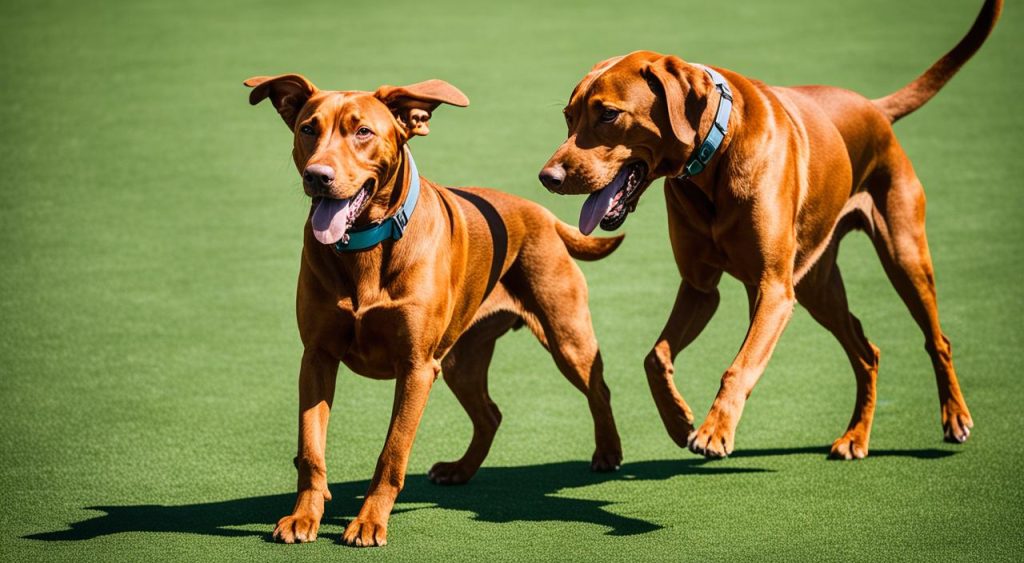Neutering a Vizsla can have a significant impact on their behavior and temperament. If you are considering neutering your Vizsla, you may have questions about how it will affect their demeanor. While neutering may not completely calm them down, it can make them easier to manage and more focused. It can also reduce the likelihood of certain behavioral issues, such as aggression towards other dogs. However, it’s important to note that individual responses to neutering can vary, and other factors such as training and socialization also play a role in a Vizsla’s behavior.
Key Takeaways:
- Neutering a Vizsla may make them easier to manage and more focused.
- It can reduce the likelihood of certain behavioral issues, such as aggression towards other dogs.
- Individual responses to neutering can vary, and other factors such as training and socialization also play a role in a Vizsla’s behavior.
The Effects of Neutering on Vizslas
Neutering can have various effects on a Vizsla’s behavior. Some Vizslas may experience a decrease in energy levels after being neutered, resulting in a calmer demeanor. Neutering can also help reduce certain behaviors commonly associated with intact males, such as marking and humping. However, it’s important to understand that neutering is not a guaranteed solution to completely change a Vizsla’s behavior, as individual temperament and personality also play a significant role in their behavior.
Timing of Neutering in Vizslas
The timing of neutering can play a role in a Vizsla’s behavior and temperament. It is generally recommended by experts to wait until a Vizsla is fully mature, typically around 1-2 years old, before considering neutering.
Waiting until the Vizsla is fully mature allows their hormones to fully develop, which may contribute to a more balanced temperament. This can potentially result in a calmer demeanor after neutering.
However, it’s important to remember that each Vizsla is unique and will respond differently to neutering. There is no specific timeline for when a Vizsla will calm down after being neutered.
To determine the best timing for your individual Vizsla, it is advisable to consult with a veterinarian. They will be able to provide guidance based on your Vizsla’s specific needs and health considerations.
Addressing Behavioral Issues in Neutered Vizslas
Neutering can be beneficial in addressing certain behavioral issues in Vizslas, including anxiety. After being neutered, some Vizslas may experience a reduction in anxiety levels as a result of decreased hormone levels. This hormonal balance can help regulate their emotions and contribute to a calmer disposition.
However, it’s important to note that neutering alone may not completely resolve anxiety issues in Vizslas. While it can have a positive impact, addressing anxiety effectively often requires additional behavior modification techniques such as training and socialization. These techniques can help Vizslas develop coping mechanisms and build confidence to manage their anxiety more effectively.
“Neutering is a valuable tool in managing behavioral issues like anxiety in Vizslas, but it works best in conjunction with other forms of behavior modification.”
By combining neutering with training and socialization, owners can address anxiety holistically and provide the best possible support for their neutered Vizsla. Consulting with a professional trainer or behaviorist can help develop a personalized plan tailored to the specific needs of the dog, ensuring effective management of anxiety and overall behavioral well-being.
Considerations for Neutering a Vizsla
Before deciding to neuter your Vizsla, it’s important to consider several factors. Neutering can have an impact on your Vizsla’s behavior, including the potential for a decrease in energy levels. However, it’s crucial to weigh the pros and cons, as neutering is a permanent decision that can affect your dog’s overall temperament.
Consulting with a veterinarian is essential to determine the best timing for neutering based on your Vizsla’s individual needs and health considerations. They can guide you in making an informed decision that takes into account your Vizsla’s specific behavior after neutering and energy levels.
Additionally, it’s important to understand that neutering is not a guarantee to completely change your Vizsla’s behavior. While it can help reduce certain behaviors associated with intact males, such as marking and humping, individual temperament and personality also play a significant role in a Vizsla’s behavior.
By considering your Vizsla’s behavior after neutering and the potential impact on energy levels, you can make an informed decision that takes into account your dog’s unique needs. Remember, consulting with a veterinarian is crucial to make the best choices for your Vizsla’s well-being.
The Role of Training and Socialization
While neutering can have an impact on a Vizsla’s behavior, it’s important to understand that training and socialization play vital roles in shaping their behavior, regardless of whether they are neutered or not. Consistent training and positive socialization experiences are key to promoting good behavior and developing a well-adjusted temperament in Vizslas.
Training helps Vizslas understand and respond to commands, teaching them appropriate behaviors and boundaries. It allows you to establish clear communication with your Vizsla and reinforces positive behaviors while discouraging negative ones. Positive reinforcement training methods, such as using treats and praise, can be highly effective in shaping a Vizsla’s behavior.
“Training your Vizsla helps build a strong bond and trust between you and your furry friend. It provides mental stimulation and builds their confidence. Consistency, patience, and positive reinforcement are key elements of successful Vizsla training.” – Vizsla Training Expert, Olivia Harris
Socialization is equally important in shaping a Vizsla’s behavior. Exposing them to various environments, people, animals, and situations from a young age helps them develop social skills and become confident and well-adjusted dogs. Socialization helps prevent fear, anxiety, and aggression, contributing to a balanced temperament in Vizslas.
The Importance of Continued Training and Socialization After Neutering
Even though neutering can help reduce certain behaviors, it should not replace the need for continued training and socialization. Neutering alone cannot address all behavioral issues or ensure a perfectly well-behaved dog. Ongoing training and socialization are essential to reinforce positive behaviors, manage any remaining behavioral issues, and maintain a harmonious relationship with your Vizsla.
Post-neutering, Vizslas may still benefit from training to fine-tune their behavior and maintain good manners. Focus on reinforcing desired behaviors, such as walking nicely on a leash, coming when called, and being calm and well-behaved around people and other animals.
Consistent socialization is also crucial post-neutering. Continue exposing your Vizsla to new experiences, people, and animals to ensure they remain friendly, confident, and adaptable. This will help prevent any potential regression in behavior and ensure they continue to grow into well-rounded and happy dogs.
Conclusion
Neutering can have a significant impact on a Vizsla’s behavior, potentially leading to a calmer temperament and a reduction in certain behaviors associated with intact males. However, it is important to note that the effects of neutering can vary among individual Vizslas, and other factors such as training and socialization also play a crucial role in shaping their behavior.
When considering neutering for your Vizsla, it is advisable to consult with a veterinarian to make an informed decision. They can provide guidance on the best timing for neutering based on your Vizsla’s specific needs and health considerations.
While neutering can contribute to a Vizsla calming down, it should not be viewed as a standalone solution. Consistent training and positive socialization experiences are essential for promoting good behavior and a well-adjusted temperament in Vizslas, regardless of whether they are neutered or not.
Remember, every Vizsla is unique, and it may take some time for the effects of neutering to manifest. Be patient and continue providing your Vizsla with love, care, and consistent training to ensure a well-balanced and contented companion.





